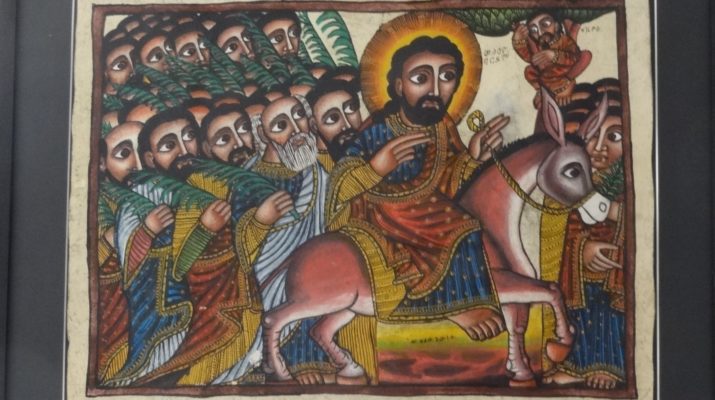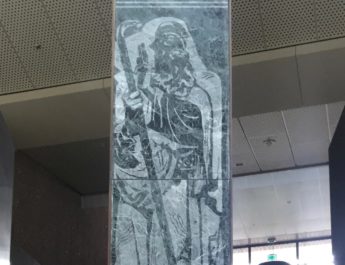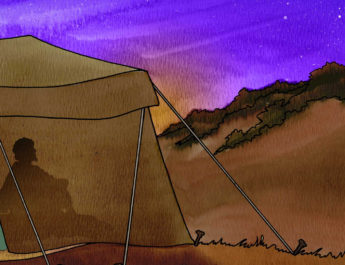Luke 19:29-44
Narrative Lectionary 336
29 WhenA he had come nearB BethphageC and Bethany,D
A {untranslated} = ginomai. This is to come into being, to happen, become, be born. It can be to emerge from one state or condition to another or is coming into being with the sense of movement or growth.
B “come near” = eggizo. From eggus (nearby or near in time). This is extremely close by – approaching, at hand, immediately imminent.
C “Bethphage” = Bethphage. 3x in NT– all in Jesus’s Palm Sunday entry into Jerusalem. From Aramaic beth phagy (Bethphage, house of unripe figs). This is Bethphage, house of unripe or early figs.
D “Bethany” = Bethania. 12x in NT. From Aramaic beth anya (house of affliction, misery, wretchedness). This is Bethany.
at the place calledE the Mount of Olives, he sentF two of the disciples,G
E “called” = kaleo. Related to keleuo (to command, order, direct); from kelomai (to urge on). This is to call by name, invite, to name, bid, summon, call aloud.
F “sent” = apostello. From apo (from, away from) + stello (to send, set, arrange, prepare, gather up); {probably from histemi (to make to stand, stand, place, set up, establish, appoint, stand firm, be steadfast)}. This is to send forth, send away, dismiss, send as a messenger. It implies one that is sent for a particular mission or purpose rather than a quick errand. This is where “apostle” comes from.
G “disciples” = mathetes. From matheteuo (to make a disciple of); from manthano (to learn key facts, gain knowledge from experience; generally implies reflection as part of the learning process); from math– (thinking things through). This is a disciple, learner, or student. It is where we get “mathematics” from.
30 saying, “GoH into the villageI ahead of you, and as you enterJ it
H “go” = hupago. From hupo (by, under, under the authority of) + ago (lead, bring, guide, spend, drive, carry). This is to lead under so to depart, go away, or die. It is to lead away under the command of someone else, being given a mission or objective to carry out.
I “village” = kome. This is a village as contrasted with a city that has a wall.
J “enter” = eisporeuomai. From eis (to, into, for, among) + poreuomai (to go, travel, journey, die; refers to transporting things from one place to another; focuses on the personal significance of the destination); {from poros (passageway)}. 18x in NT. This is to enter or journey in in a literal or figurative sense.
you will findK tiedL there a coltM that has never been ridden.N UntieO it and bringP it here.
K “find” = heurisko. This is to find, learn, or obtain. It is to discover something, which generally implies a period of searching for it. This is to find in a literal or figurative sense. This is where the word “heuristic” comes from.
L “tied” = deo. To tie, bind, compel, put in chains. This is to bind in a literal or figurative sense. Can also mean declaring something unlawful.
M “colt” = polos. 12x in NT– all in Jesus’s Palm Sunday entry into Jerusalem. This is foal, colt, or young donkey.
N “never been ridden” = epi + hos + oudeis + popote + anthropos + kathizo. Literally “on which no person yet has sat.” Anthropos is probably from aner (man, male, husband) + ops (eye, face). This is human, humankind. Used for all genders. Kathizo is from kathezomai (to sit down, be seated); {from kata (down, against, according to, among) + hezomai (to sit); {from aphedron (a seat, a base)}}. This is to sit, set, appoint, stay, rest.
O “untie” = luo. This is to loose, release, or untie. Figuratively, it can mean to break, destroy, or annul. This is releasing what had been withheld.
P “bring” = ago. Related to “go” in v30. See note H above.
31 If anyone asksQ you, ‘Why are you untying it?’ just say this, ‘The LordR needsS it.’”
32 So those who were sent departed and found it as he had told them. 33 As they were untying the colt, its ownersT asked them, “Why are you untying the colt?”
34 They said, “The Lord needs it.”
Q “asks” = erotao. From eromai (to ask) OR from ereo (to say, tell, call, speak of). This is asking a question or making an earnest request. It is used between someone with whom the asker is close in some sense. So, they anticipate special consideration for their request.
R “Lord” = kurios. From kuros (authority, supremacy). This is a respectful address meaning master or sir. It refers to one who has control or power greater than one’s own. So, it was also applied to God and Jesus as Master or Lord.
S “needs” = chreia. From chraomai (to use, make use of, give what is needed, act in a specific way, request); related to chre (what is proper, fitting, or necessary). This is the is task, business, or affair. It can also be need, want, or destitution.
T “owners” = kurios. Same as “Lord” in v31. See note Q above.
35 Then they brought it to Jesus;U and after throwingV their cloaksW on the colt, they set Jesus onX it.
U “Jesus” = Iesous. From Hebrew Yehoshua (Joshua, the Lord is salvation); {from YHVH (proper name of the God of Israel; the self-existent and eternal one); {from havah (to become) or from hayah (to come to pass, become, be)} + yasha (to deliver, defend, help, preserve, rescue; properly, to be open, wide or free, which implies being safe. So, in a causative sense, this is to free someone)}. This is Jesus or Joshua in Greek – the Lord saves or the Lord is salvation.
V “throwing” = epiripto. 2x in NT. From epi (on, upon, among, what is fitting) + rhipto (to cast, toss fling, or disperse; a quick toss in contrast to another word ballo, intentional hurling, and teino (stretching outward)); {perhaps related to rhapizo (to hit with a rod or to slap); from a derivation of rhabdos (staff, rod, cudgel; a staff that denotes power, royalty, or authority); from rhepo (to let fall, to rap)}. This is to throw or cast in a literal or figurative sense (like casting you anxiety on God).
W “cloaks” = himation. From heima (garment) OR from ennumi (to put on). This is the outer garment, cloak, robe, or mantle. It is worn loosely over a tunic.
X “set…on” = epibibazo. 3x in NT – including the Good Samaritan putting the wounded man on his own animal. From epibaino (to board, a horse or vessel, step on, arrive, go abroad); {from epi (on, upon, against, what is fitting) + baino (to walk, go)}. This is to place on.
36 As he rode along,Y people kept spreadingZ their cloaks on the road.AA
Y “rode along” = poreuomai. Related to “enter” in v30. See note J above.
Z “spreading” = hupostronnuo. 1x in NT. From hupo (by, under, about, under someone’s authority) + stronnuo (to spread, make a bed). This is to spread under like a carpet.
AA “road” = hodos. This is way, road, path, or journey. It can imply progress along a route.
37 As he was now approachingBB the path downCC from the Mount of Olives, the wholeDD multitudeEE of the disciples
BB “approaching” = eggizo. Same as “come near” in v29. See note B above.
CC “path down” = katabasis. Related to “set…on” in v35. 1x in NT. From katabaino (to come down whether from the sky to the ground or from higher ground to lower, literal or figurative); {from kata (down, against, throughout, among) + baino (see note X above)}. This is a descent or path down.
DD “whole” = hapas. From hama (at once, together with) +pas (all, every, every kind of) OR from a (with) + pas (see above). This is all; every part working together as a unit.
EE “multitude” = plethos. From pletho (to fill, accomplish, supply; to fill to maximum capacity). This is fullness, multitude, great number.
beganFF to praiseGG GodHH joyfullyII with a loud voiceJJ for all the deeds of powerKK that they had seen,LL
FF “began” = archomai. From archo (to rule, begin, have first rank or have political power). This is to begin or rule.
GG “praise” = aineo. 8x in NT. From ainos (praise, saying, story, proverb). This is to praise.
HH “God” = Theos. From Proto-Indo-European origins, meaning do, put, place. This is God or a god in general.
II “joyfully” = chairo. From char– (to extend favor, lean towards, be inclined to be favorable towards). This is to rejoice, be glad or cheerful; a greeting. This is the root verb that the Greek word for “grace” comes from (charis).
JJ “voice” = phone. Probably from phemi (to declare, say, use contrasts in speaking to shed light on one point of view); {from phao (to shine) or phaino (to bring light, cause to appear, shine, become visible or clear). This is a voice, sound, tone or noise. It can also be a language or dialect.
KK “deeds of power” = dunamis. From dunamai (to be able, have power or ability). This is might, strength, physical power, efficacy, energy, and miraculous power. It is force literally or figuratively – the power of a miracle or the miracle itself.
LL “seen” = horao. To see, perceive, attend to, look upon, experience. Properly, to stare at and so implying clear discernment. This, by extension, would indicate attending to what was seen and learned. This is to see, often with a metaphorical sense. Can include inward spiritual seeing.
38 saying,
“Blessed isMM the kingNN
who comes in the nameOO of the Lord!
PeacePP in heaven,QQ
and gloryRR in the highest heaven!”
MM “blessed is” = eulogeo. From eu (good, well, well done, rightly) + logos (word, statement, speech, analogy; a word that carries an idea or expresses a thought, a saying; a person with a message or reasoning laid out in words; by implication, a topic, line of reasoning, or a motive; can be used for a divine utterance or as Word – Christ); {from lego (to speak, tell, mention)}. Properly, this is speaking well of – speaking so that the other is benefited. It can mean praise, bless, thank, or call for a blessing. This is where “eulogy” comes from.
NN “king” = basileus. Related to “set…on” in v35 & “path down” in v37. Probably from basis (step, hence foot; a pace); from baino (see note X above). This is king, emperor, or sovereign.
OO “name” = onoma. May be from ginosko (know, recognize, learn from firsthand experience). This is a name, authority, cause, character, fame, reputation. The name was thought to include something of the essence of the person so it was not thought to be separate from the person.
PP “peace” = eirene. Perhaps from eiro (to join, tie together to form a whole). This is one, peace, quietness, rest, peace of mind, harmony. Peace was a common farewell among Jews (i.e. shalom) and this well-wishing included a blessing of health and wholeness for the individual. This word also indicates wholeness and well-being – when everything that is essential is joined together properly. This is peace literally or figuratively. By implication, it is prosperity (but not in the sense of excessive wealth. Prosperity would have meant having enough from day to day.)
QQ “heaven” = ouranos. May be related to oros (mountain, hill) with the notion of height. This is the air, the sky, the atmosphere, and heaven. It is the sky that is visible and the spiritual heaven where God dwells. Heaven implies happiness, power, and eternity.
RR “glory” = doxa. From dokeo (to have an opinion, seem, appear, suppose; a personal judgment; to think); from dokos (opinion). This is literally something that evokes a good opinion – something that connects to our understanding of intrinsic worth. The ultimate expression of this is, of course, God and God’s manifestation. So, this is opinion, honor, and dignity, but also praise, glory, renown, and worship.
39 Some of the PhariseesSS in the crowd said to him, “Teacher,TT order your disciples to stop.”UU
SS “Pharisees” = Pharisaios. From Aramaic peras (to divide, separate) and from Hebrew parash (to make distinct, separate, scatter). This is a Pharisee, a member of a Jewish sect active in the 1st century. Their name meant separate in the sense of wanting to live a life separated from sin. Whereas the Sadducees were part of the priestly line and inherited their religious position and responsibilities, Pharisees were regular people who studied the scriptures and offered guidance to regular folk. Sadducees were often wealthier and willing to sacrifice their identity to rub elbows with Roman society. Pharisees were often more concerned with what it meant to follow God without compromising what made them different as followers of God. Sadducees primarily believed in that which was written down (the first five books of the Bible) and Pharisees believed in the Bible and the traditions of the elders. Pharisees had a very wide range of interpretations and diversity of opinion. Their standard mode of religious engagement was lively debate with one another. To argue religion with another teacher was to recognize that they had something of value to offer.
TT “Teacher” = didaskalos. From didasko (to teach, direct, instruct, or impart knowledge; in the New Testament, almost always used for teaching scripture); from dao (to learn). This is teacher or master.
UU “order…to stop” = epitimao. From epi (on, upon, against, what is fitting) + timao (properly, this is setting a value or price on something, to estimate. Figuratively, it speaks to what level of honor we afford someone or something depending on our personal feeling toward it. By implication, this can mean to revere or honor); {from time (worth or perceived value; literally, price, but figuratively, the honor or value one sees in someone or something; can be esteem or dignity; can also mean precious or valuables); from tino (to pay, be punished, pay a penalty or fine because of a crime); from tio (to pay respect, value)}. This is to render what is due – to assign the value that is appropriate for the situation. So, it could mean to honor or to warn, to rebuke or to charge. Generally, it is a warning meant to guide someone away from doing something wrong or taking the wrong path. It can imply to forbid.
40 He answered, “I tell you, if these were silent,VV the stonesWW would shout out.”XX
VV “were silent” = siopao. 10x in NT. From siope (silence or muteness). This is to be silent whether by choice or not. Figuratively, this is being calm as water, keeping one’s peace.
WW “stones” = lithos. This is stone literal or figurative.
XX “shout out” = krazo. This is to cry out, scream, shriek. It is onomatopoeia for the sound of a raven’s call. Figuratively, this means crying out urgently without intelligible words to express something that is deeply felt.
41 As he came near and saw the city,YY he weptZZ over it, 42 saying, “If you, even you, had only recognizedAAA on this day the things that make for peace! But now they are hiddenBBB from your eyes.CCC
YY “city” = polis. This is a city or its inhabitants. It is a town of variable size, but one that has walls. This is where “metropolis” and “police” come from.
ZZ “wept” = klaio. This is to weep, lament, or sob. It is weeping aloud.
AAA “recognized” = ginosko. Related to “name” in v38. See note OO above.
BBB “hidden” = krupto. 18x in NT. This is to hide by covering, secret, hidden things. This is the root of the word “cryptography.”
CCC “eyes” = ophthalmos. From optanomai (to appear, be seen by). This is eye or sight. It is used figuratively for the mind’s eye, a vision, or for envy.
43 Indeed, the days will comeDDD upon you, when your enemiesEEE will set up rampartsFFF aroundGGG you and surroundHHH you, and hem you inIII on every side.
DDD “come” = heko. This is to come or arrive as at a final destination or goal. It can also mean being present in a literal or figurative sense.
EEE “enemies” = echthros. From echthos (hatred). This is an openly hostile person so an enemy, a foe, or a hated person. This speaks of irreconcilable hostility. It can also mean adversary and/or refer to Satan.
FFF “ramparts” = charax. 1x in NT. From the same as charagma (an engraving, stamp, sculpture, or brand mark; a mark that shows ownership identification or the mark on a coin or seal); from charasso (to engrave or sharpen). This is a rampart, barricade, a mound used in siege.
GGG “set up…around” = parembole. 11x in NT. From para (by, beside, in the presence of) + emballo (to throw in, subject to); {from en (in, on, at, by, with) + ballo (to throw, cast, place, put, drop)}. This is a juxtaposition, camp, barracks.
HHH “surround” = perikukloo. 1x in NT. From peri (about, concerning, around, encompassing) + kukloo (to surround, besiege, circle around); {from the same as kuklo (circle, ring, around); from kuklos (circle, cycle)}. This is to encircle, encompass, totally blockade. It shares a root with the word “cycle.”
III “hem…in” = sunecho. 12x in NT. From sun (with, together with) + echo (to have, hold, possess). This is to hold together or hold fast, to close or press together. It can also be to be struck by an illness, arrested, compressed as by a multitude or a siege. Figuratively, it can mean to compel, perplex, preoccupy, or generally afflict.
44 They will crush you to the ground,JJJ you and your childrenKKK within you, and they will not leaveLLL within you one stone upon another; because you did not recognize the timeMMM of your visitationNNN from God.”
JJJ “crush…to the ground” = edaphizo. 1x in NT. From edaphos (basis, base, soil); from hedraios (sitting, well-seated, immovable; figuratively, steadfast, firm, morally fixed); {from hedra (seat)}. This is to raze or crush to the ground.
KKK “children” = teknon. From tikto (to beget, bring forth, produce). This is a child, descendant, or inhabitant.
LLL “leave” = aphiemi. From apo (from, away from) + hiemi (to send). This is send away, release, permit, forgive, allow to depart, discharge, or send forth.
MMM “time” = kairos. This is season, opportunity, occasion. The word chronos is used for chronological time. Kairos is used for spiritually significant time – the right time or appointed time.
NNN “visitation” = episkope. 4x in NT. From episkeptomai (to look at, look out for, see, select, visit); {from epi (on, upon, at, what is fitting) + the base of skopos (a mark or goal like the marker at the end of a race; figuratively, other goals or destinations; also, a watch or sentry); {from skeptomai (to peer out, consider, gaze carefully); perhaps related to skapto (to dig or excavate)}}. This is oversight, supervision, visitation. It also came to refer to Christian bishops overseeing the church. It is the same root that “episcopal” comes from.
Image credit: “Bose Monastery: Palm Sunday Entry into Jerusalem” – photo by Jim Forest, 2014.




